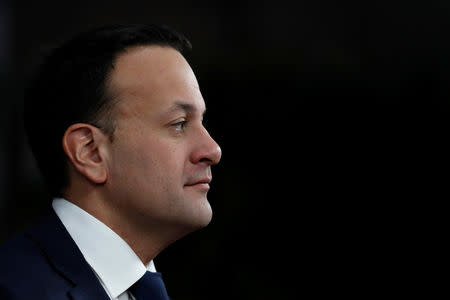Irish government under pressure at home over no-deal Brexit border plans
By Padraic Halpin
DUBLIN (Reuters) - Ireland's government came under further pressure on Wednesday to explain how its border with British-run Northern Ireland would be managed if Britain leaves the European Union without a withdrawal agreement in March.
A suggestion by the European Commission's chief spokesman on Tuesday that a no-deal Brexit would lead to the return of a hard border on the island, complete with customs checks, focussed attention on Dublin's insistence that it will not even countenance contingency plans for such an outcome.
The spokesman added on Wednesday that the bloc would do its utmost to avoid a hard border regardless of how Brexit goes.
Irish Prime Minister Leo Varadkar's government will only say that there would have to be "very difficult conversations" over border arrangements if Britain leaves without a deal.
Challenged on that position a number of times on national radio earlier on Wednesday, Agriculture Minister Michael Creed said: "We have made it an imperative in our negotiating strategy from day one that we would not countenance border infrastructure."
"It is imperative now that the focus remains fully on London," Creed told Ireland's RTE.
Mairead McGuinness, a vice president of the European Parliament and member of Varadkar's Fine Gael party, said all sides needed to wait and see what emerges from the British parliament next week, particularly regarding an opposition amendment that could prevent a no-deal Brexit in March.
That attempt gained momentum in London on Wednesday, pushing sterling to its highest level against the dollar in two months.
Opposition politicians in Ireland, who last year gave near unanimous backing to the divorce deal, including the "backstop" insurance policy to keep the border open, are now demanding more clarity on no-deal border planning.
"If we're committed to no border in the event of a no-deal Brexit, I would very much welcome - as I think our citizens would - an explanation as to how that's possible and what they're going to do about it," Lisa Chambers, Brexit spokesman for the main Fianna Fail opposition party, told RTE.
"Because the question is being rightly asked that it doesn't really add up."
Ireland's main business lobby continued to back Dublin's emphatic stance on the "backstop" but said it would begin to push harder for some kind of means to avoid a cliff-edge exit if the risk of a no-deal outcome increases.
"From a business point of view, the most important thing is time, so even if we find ourselves in a no-deal scenario, we need a transition. Mechanisms can be found to retain the status quo for a period of time," the Irish Business and Employers Confederation (IBEC) policy chief Fergal O'Brien told Reuters.
(This story has been refilled to correct date of Agriculture Minister interview to Wednesday)
(Editing by Janet Lawrence)

 Yahoo News
Yahoo News 

